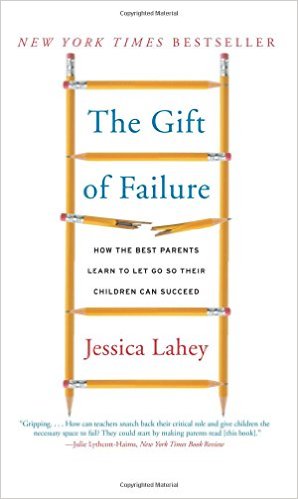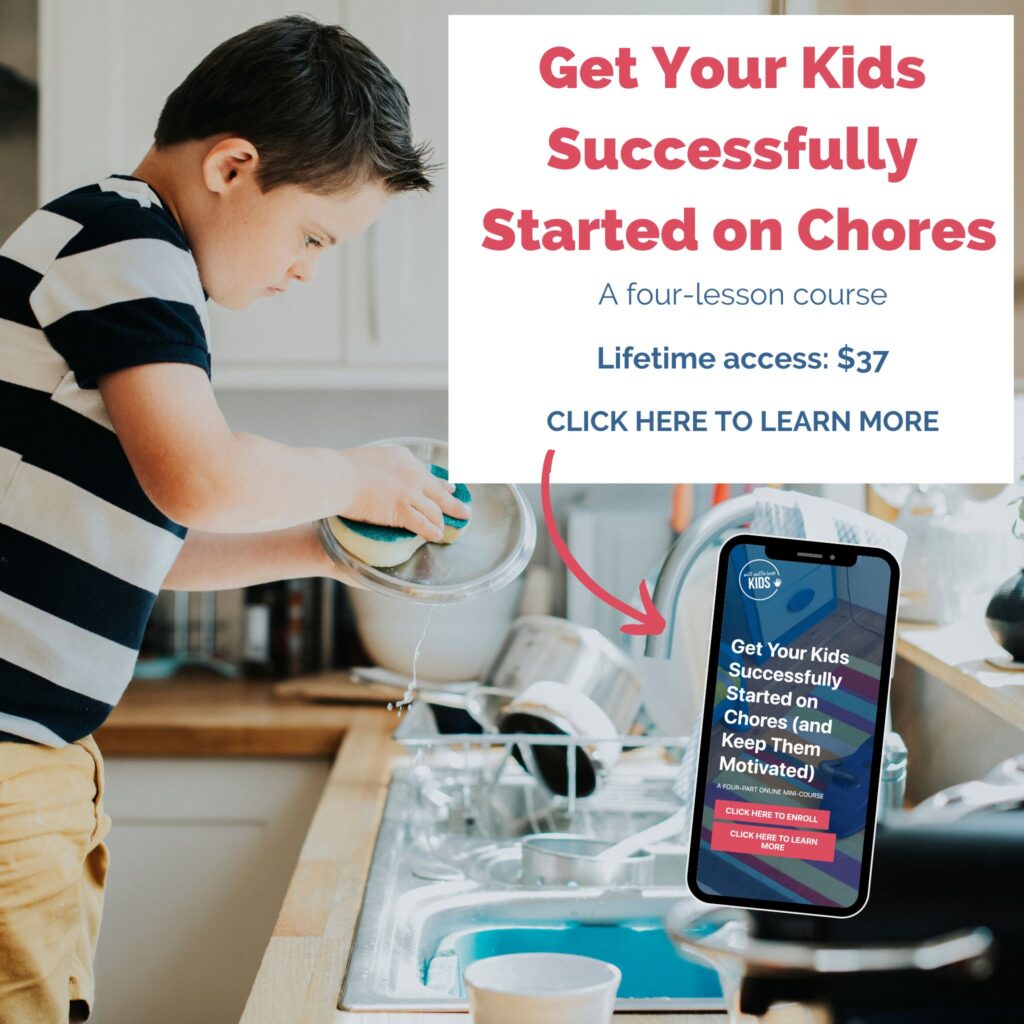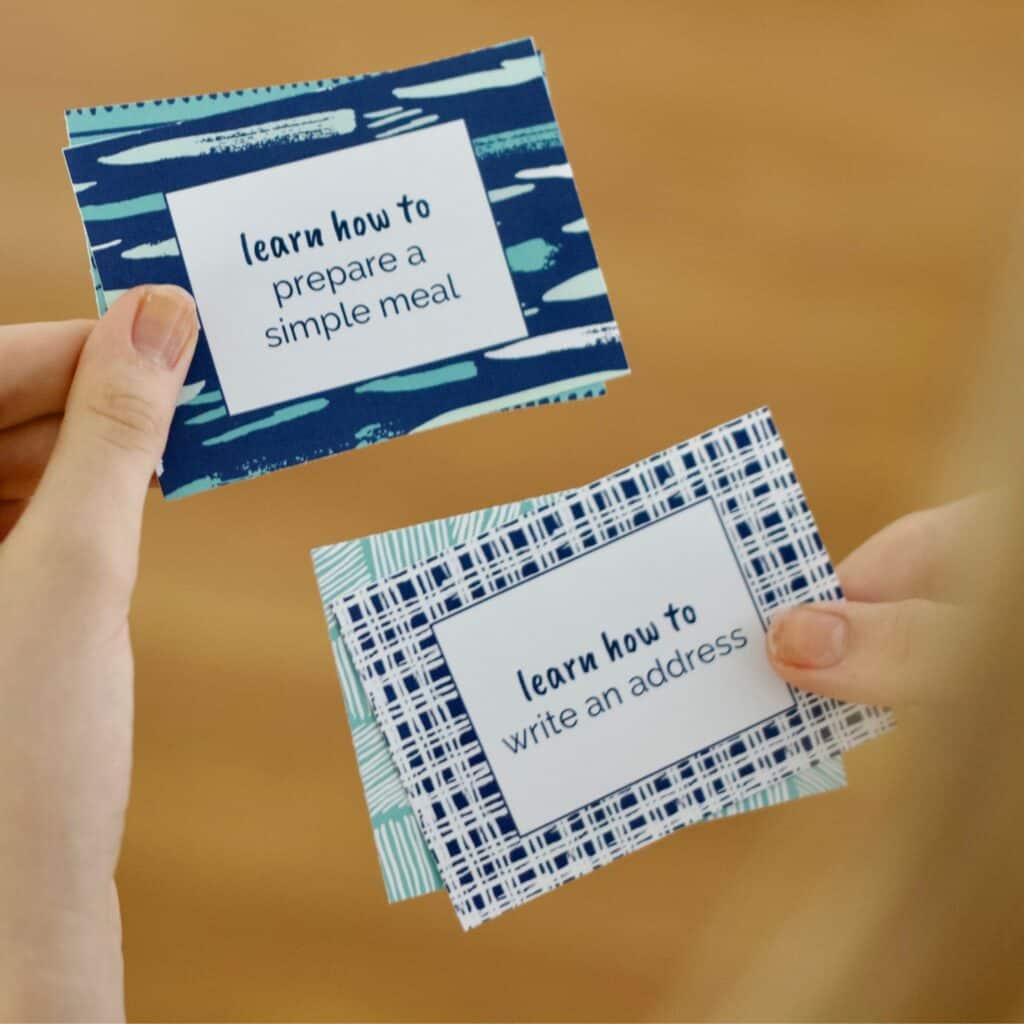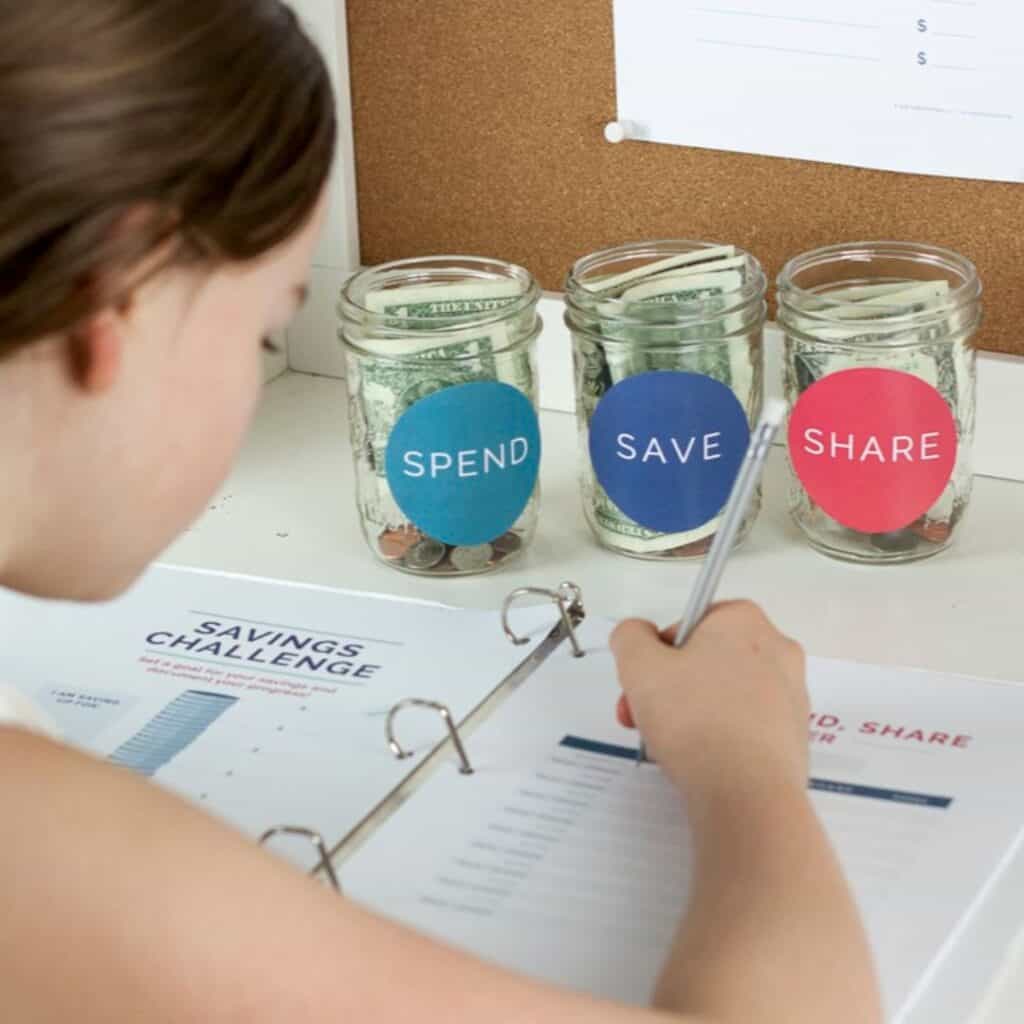16 Life Skills Your Kids Will Need Before They Leave Home
These life skills for kids help children grow into confident, self-sufficient adults.

You’ve heard the stories before:
- The good student who struggles in college — not with classes, but with living on their own
- Highly intelligent adults who don’t know how to budget and wind up deep in debt
- Young professionals who let their parents call their boss because they don’t know how to stand up for themselves
As parents, a lot of our focus is on academics – getting kids through school successfully with good grades.
But helping kids learn basic life skills – from doing laundry to managing money to standing up for oneself – can be equally important to our children’s success.
Without many of the skills listed below, even the most well-educated adults will find themselves at a disadvantage in both the workplace and life.
While kids may be able to acquire some of these skills in school (time management) or take classes (cooking or driver’s ed), a few are more nuanced and require the encouragement and support of a parent.
16 Life Skills for Kids: Essential Skills Every Child Needs Before Leaving Home
Many of these sixteen life skills for kids are second nature to adults. So it can be difficult to remember which skills our kids need to learn before leaving home.
This list should help! And it provides links to resources and books to get you started.
Ready to teach your child life skills? These cards can help! Each card in this eighty-one deck contains a skill your child can begin practicing with you or on their own. Click here or the image below to learn more.
Understand Money Management
Want to teach your child a life skill that could literally make or break their success as an adult? Teach them about money.
Other than education, nothing will ensure kids’ success as an adult than teaching them to be money-savvy. This includes understanding what it takes to manage money, delay gratification, responsible ways to handle debt, and how to manage a bank account and invest for future goals.
Parents can begin to teach kids about money at a young age. Having conversations with kids about money is proven to be one of the most important ways for kids to learn.
When they’re a bit older, letting kids manage money on their own (i.e. giving them an allowance and, possibly, a bank account) provides hands-on education and will help kids understand how money works and the importance of saving towards a goal.
Recommended books:
The Opposite of Spoiled, by Ron Lieber
Make Your Kid a Money Genius, by Beth Koblinger
See related:
How to Talk to Kids About Money (Without Creating Entitlement or Fear)
How to Get Started on Kids Allowance – the RIGHT Way
9 Mistakes to Avoid When Giving Kids Allowance
Investing for Kids – a Commonsense Approach to Teaching the Basics
Everything Your Child Needs to Know About Money Before Leaving Home
The Kids Money Management Toolkit has everything you need (except money!) to begin giving your kids an allowance. In addition to guidance and advice, you’ll also receive Save, Spend, and Share jar labels, a Kids Money Ledger, a Savings Challenge Sheet, a Jobs-for-Hire Sheet, and a Kids Allowance Contract. Click here to learn more.
Know How to Cook
Research shows that people who frequently cook meals at home eat healthier and consume fewer calories than those who cook less. So teaching kids this life skill often means setting them up for a healthier diet in the future.
Plus, home-cooked meals are often less expensive than prepared foods. So adults who know how to cook also have the ability to keep their food budgets in check.
The first step in making kids comfortable in the kitchen is to give them safe and easy-to-use tools and gadgets, such as a knife or vegetable peeler, for example. See 11 Tools That Turn Kids Into Confident Kitchen Helpers for a list of helpful supplies.
Thirty Handmade Days provides some great ideas for how to begin teaching kids to cook in its post, Kids Cooking Camp at Home.
And the online course Kids Cook Real Food – teaches kids all the basic cooking skills they need to become independent chefs and bakers. By the end of the course, kids will be able to cook a simple meal and make their own snacks.
Other resources include two popular kids’ cookbooks that incorporate cooking lessons alongside recipes:
Kid Chef: The Foodie Kids Cookbook
Cooking Class: 57 Fun Recipes Kids Will Love to Make and Eat

Be a Self-Starter
Employers complain that recent graduates need step-by-step instructions to complete even the smallest task. Many of these graduates grew up in households where parents managed their schedules and hovered over every task.
Parental involvement is certainly beneficial to some extent. But allowing kids to experience some independence in their childhood, and letting them figure out a few things on their own, nurtures feelings of self-esteem that translate into a can-do attitude.
Homework is one of the biggest areas where parents tend to hover. But sometimes it’s tricky to determine when a parent should get involved and when they should back off. This guide by Joanne Nesbitt can help: Helping Kids Become Self-Starters.
The book Can-Do Kids, written by an entrepreneur and a child psychologist, examines what it takes to raise kids who have a self-starter mindset similar to entrepreneurs.
Don’t know when it’s appropriate for kids to begin doing certain tasks independently? Sign up for my weekly(ish) newsletter, and you’ll receive this Age-Appropriate Guide to Kids’ Independence as a free gift. (Click on the image below to subscribe).
See Related:
Raise Kids Who Are Self-Starters and Put an End to Homework Fights
Talk to Strangers
Out in the world on their own, our kids will encounter many strangers – professors, coaches, advisors, landlords, store clerks, managers, and co-workers just to name a few.
Our adult kids need to know how to look these people in the eyes, clearly communicate with them, and possibly even advocate for themselves. But if kids have never been encouraged to speak to strangers on their own – if their parents have always spoken for them – kids’ communication skills will be stilted which could, among other things, come across poorly in a job interview.
And that advice parents give to kids about “not talking to strangers”? Stats show it’s more likely your TV set will fall on your child’s head than a stranger will abduct them. Try a different approach that lets kids know that not all strangers are bad. For example, one Mom told her kids that if they ever get lost to look for another mom with kids – she’ll be most likely willing to help.
Independently Manage Time
Let’s face it, there are many adults who could still learn a thing or two about time management. But the more kids understand this life skill before living independently, the more successful they’ll be.
Managing one’s time is a skill kids need to learn to successfully manage a busy college schedule or assign priority to a variety of work projects.
It might be tempting to simply dictate when kids should do which activities and in what order. But kids will learn best if they can practice time management independently. Working with your child to establish routines or schedules models appropriate time management.
Bullet four in this article, Don’t Procrastinate! Teach Your Child Time Management is an especially helpful tip for getting kids to take ownership of their time management.
See related:
The Trick to Getting Kids to Manage Their Own Time and Get Things Done (Without Nagging)
How to Establish a Calm Morning Routine for Kids That Actually Works
The Best Bedtime Routine to Get Your Kids to Fall Asleep and Stay Asleep
6 Ways Kids Routines Encourage Independence and Bring More Sanity to Your Life
Stand Up for Oneself
Adults are often in situations where they have to advocate for themselves. For example, they may need to ask their boss for a raise, let a stranger know they accidentally cut them in line, or tell a waiter that their bill is incorrect.
These situations can sometimes be tricky. But imagine if we’d never been given the chance to practice standing up for ourselves – with teachers, coaches, or peers?
While it may sometimes be tempting to speak up and advocate for our kids, this should be the exception, not the rule. Instead, embrace opportunities for kids to take the lead, and stand up for themselves. These moments will help build kids’ confidence, resilience, and set them up for greater success as adults.
Parents can also coach kids through tricky situations by being willing to listen and offering advice if it’s asked for. Sometimes kids need to talk about difficult situations to problem-solve on their own. Know too that kids are watching you and taking notes on your behavior if you need to advocate for yourself.
For more about how parents can help kids stand up for themselves see: How to Help Kids Stand Up for Themselves
Recommended Books:
How to Raise an Adult, by Julie Lythcott-Haims
The Me, Me, Me Epidemic: A Step-by-Step Guide to Raising Capable, Grateful Kids in an Over-Entitled World, by Amy McCready
Cope with Failure
Failure is tough. And seeing your kids fail? Even tougher.
But as difficult as it is to see our kids make mistakes – failure is full of big lessons.
As Jessica Lahey, author of the book “The Gift of Failure” says, when parents correct their kid’s mistakes, they’re helping in the moment but ultimately doing harm.
Kids who have never dealt with failure may be unable to cope when a relationship goes sour, or a work project doesn’t pan out. In essence, failure teaches kids problem-solving skills they’ll need throughout their lives.
“All this swooping and fixing make for emotionally, intellectually, and socially handicapped children,” she writes, “unsure of their direction or purpose without an adult on hand to guide them.”
Read more about the importance of letting kids fail here: How to Give Your Child the Gift of Failure

See related:
How to Help Children Cope With Failure
Find a Job
Remember the first time you put together a resume and were confused about all the “rules”? Or those feelings of uncertainty as you walked into your first interview?
There’s a protocol for finding a job, and practicing all the steps it takes to land one is a valuable life skill for kids.
Unfortunately, not as many teens are given the opportunity to work a part-time job. Priority is often given to after-school activities and summers filled with sports, classes, and volunteer trips.
But as a college admissions officer told Quartz – applicants who hold jobs over the summer are far more enticing than those who volunteer at an orphanage in India or interned on Wall Street.
And there’s no need to wait until kids are teens to introduce them to what it means to work. This resource provides over 90+ ideas on how kids can make money based on their different interests: How to Make Money as a Kid.
See related:
28 Perfect Part-Time Jobs for High Schoolers
34 Perfect Summer Jobs for Teens Who Want to Earn Some Extra Cash
14 Sample Interview Questions for Teens (With Realistic Answers)
Do Laundry
To adults, the basic task of doing loads of laundry feels like second nature.
After so many years of running the regular wash cycle and pressing high heat on the dryer, it’s difficult to conceive of a time when we didn’t know how to clean our dirty clothes.
But doing one’s laundry actually takes a little guidance. And no parent wants their college freshman ridiculed for not knowing how to use a washing machine.
Learn how to teach your kids how to do their laundry in nine simple steps: How to Teach Kids to Do Their Laundry Independently.

Understand and Practice Personal Hygiene
It’s imperative kids understand how to take care of their bodies so they can stay healthy and appear (and smell!) presentable to others.
Personal hygiene is something parents model for their kids when they’re babies. Daily baths, teeth brushing, hair brushing and the clipping of fingernails are all examples of hygiene habits that are established from birth.
As kids get older, and especially when they go through puberty, kids need to know how to shower independently, how to use deodorant, how to manage facial hair, and girls need to know how to manage their menstrual cycle.
It’s important that parents establish from an early age that no personal hygiene topic is off bounds for conversation. The more kids can talk to parents about the issues and challenges they’re experiencing in their growing bodies, the better informed they’ll be about the best practices of personal hygiene.
See related:
A Step-by-Step Guide to Showering and Bathing Properly
How to Start the Birds and Bees Talk (Without Dying of Embarrassment)
Take Care of One’s Things/Be Organized
It’s common knowledge that staying organized – having everything in its right place – can make people more successful at any given task.
Some kids and adults are naturally organized. But for those whose kids aren’t, there are a few things parents can do.
Checklists can help kids keep track of tasks that need to be completed. Bins and shelving can keep toys or schoolwork organized. And following routines, such as setting out clothes and packing a school bag the night before, can help with forgetfulness.
For more ideas on how to teach kids to be organized see:
25 Moms Give Tips on How to Teach Kids to Be Organized
10 Ways to Help Get Your Child Organized
12 Ways to Develop Your Child’s Organizational Skills
Clean and Take Care of a House
One of the best ways to teach kids how to clean and care for a house is through chores. Simply telling kids why it’s important to keep a clean house won’t help them understand the work involved.
And let’s face it – this will pay off for your kids later in life when they have roommates or get married. Because no one wants to live with a slob.
Beyond learning practical tasks such as how to clean a bathroom, empty the dishwasher, vacuum, or take out the trash, chores are also shown to help kids academically, emotionally, and professionally. (See How Daily Chores Set Kids Up for Success in Life to learn more)
See related:
How to Motivate Kids to Do Chores (Without Paying Them!)
7 Tips to Help You Begin Toddler Chores Successfully
Interested in getting your kids started on chores? My four-lesson course will teach you how to get started, avoid nagging & power struggles, and keep your kids motivated. Click here or the image below to learn more.

Spend Money Wisely
Shopping seems easy enough – go into a store, purchase what you need, and leave.
But to spend money wisely, one needs to understand the importance of delayed gratification, saving towards a goal, determining what a good price is for an item, and why it may not make sense to purchase something just because it’s on sale.
Kids can learn these hidden variables in the shopping experience if they manage some money on their own.
Some parents may do this with a weekly allowance, while others might choose an allowance for only certain expenditures like clothing.
See related:
How to Teach Kids Delayed Gratification in a “Buy Now, Pay Later” World
5 Tips for Teaching Kids to Be Savvy Comparison Shoppers

Drive Safely and Car Maintenance
Even if a teen doesn’t own their own car, it’s a good idea for them to know the basics of car ownership. For example, they should know: how to pump gas, when the oil needs changing, and what to do when your car has a flat tire.
Some of these topics will be covered in a driver’s ed class, but some will not. Here are helpful articles to make sure you cover the basics with your teen:
Keep Your New Driver Safe With the Right Car and the Right Rules
Basic Car Maintenance Tips for Teens
Put These 11 Things in Your Teen’s Car for Peace of Mind
Learn to Swim/Water Safety
Most parents know that learning how to swim is an essential life skill for kids to keep them safe.
But beyond this practical reason, swimming is also a beneficial low-impact sport that can be done throughout one’s lifetime.
Kids can begin to learn how to swim as early as 18 months when, at that point, the idea is to get them comfortable with the water. The easiest way to teach kids to swim is through lessons.
Use a Map and Take Public Transportation on One’s Own
Not every kid lives in a city, but whenever possible it’s helpful to teach kids how to navigate public transportation on their own.
This can be accomplished by getting kids involved when navigating a map.
For example, you could ask your child to determine which path to follow by subway or train to arrive at the correct destination.
Or you could do as the Japanese do and let your kids go on errands as young as 2 or 3.
But if that’s too young for your taste, it’s still worth considering some of the advantages of letting kids roam safe neighborhoods and cities on their own, as this Atlantic article points out: Let Your Kids Ride the Bus Alone
Other posts you may like:
9 Important 21st Century Life Skills Kids Need But Most Parents Overlook
10 Life Lessons Kids Need to Experience Before Leaving Home
At What Age Can Kids Stay Home Alone?
24 Basic Table Manners All Kids Need to Learn
What to do next…
1. Subscribe to Self-Sufficient Kids’ email list.
Like what you read here and want to learn more? Every Thursday I’ll send you one parenting tip about raising self-sufficient kids and creating the peaceful relationship you yearn to have with your child. Click here to sign up.
2. Take one of my quizzes!
Find out if you’re raising a self-sufficient kid (click here) or if you’re doing too much for your kids (click here). At the end of each quiz, you’ll be asked to provide your email address to see the results.
3. Get your kids started on chores.
Learn how to get your child started on chores (& keep them motivated + avoid power struggles) by enrolling in my Get Your Kids Successfully Started on Chores course. Click here to learn more and sign up.

About Kerry Flatley
Hi! I’m Kerry, the mother of two girls and a certified parent educator. I believe it is possible for parents to have a supportive, loving, and warm relationship with their kids while raising them to be independent and ultimately self-sufficient. Over the years, I’ve read numerous books and articles that support this belief and I’ve put these ideas into practice with my own kids. Read more about me and Self-Sufficient Kids here.



